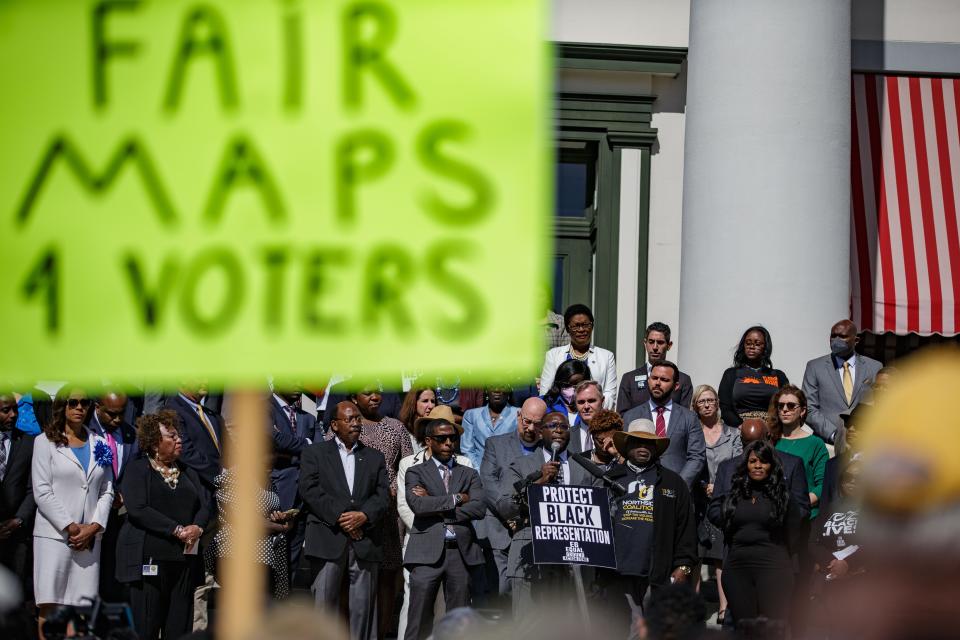Florida groups challenging DeSantis congressional map hail 2nd favorable high court ruling
- Oops!Something went wrong.Please try again later.
- Oops!Something went wrong.Please try again later.
TALLAHASSEE – A U.S. Supreme Court ruling upholding the role of state courts in congressional redistricting disputes was praised by advocates battling Gov. Ron DeSantis and the Republican-controlled Legislature over Florida’s own congressional boundaries.
Justices ruled 6-3 Tuesday to reject a legal theory advanced by North Carolina lawmakers that would have given legislatures unchecked authority to enact federal voting rules and create congressional redistricting maps guided by partisan gerrymandering.
The League of Women Voters of Florida and allied voter groups are challenging Florida’s 28-district, congressional map, where 20 seats were won by Republicans last fall.

The boundaries, crafted last year by DeSantis and approved by the Legislature amid shouts of "stop the Black attack," eliminated a North Florida district held by U.S. Rep. Al Lawson, a Black Democrat. They also scattered thousands of North Florida Black voters across four GOP-held congressional districts.
The lawsuit contends the map violates the state’s voter-approved Fair Districts constitutional amendments, which prohibit creating boundaries that diminish minority voting strength or are designed to help or hurt individual candidates or parties.
“We’re very pleased that justices upheld the power of the courts and we do think that this ruling will be helpful in our redistricting challenge,” said Cecile Scoon, co-president of the Florida League of Women Voters.
The ruling is the second by the high court this month to give challengers what one called a "window to hope" that justices could ultimately intervene favorably in the Florida case.
On June 8, the court rendered a surprise 5-4 decision that found the federal Voting Rights Act was likely violated by an Alabama congressional map, which diluted Black voting strength by having only a single district with a majority Black population.
Chief justice writes ruling
In the North Carolina case, Republicans relied on what was called the independent state legislature theory, a constitutional interpretation that state legislatures can guide the rules for federal elections, without interference from courts, governors or election officials.
Chief Justice John Roberts, writing for the court, ruled, “state courts retain the authority to apply state constitutional restraints when legislatures act under the power conferred upon them by the Elections Clause. But federal courts must not abandon their own duty to exercise judicial review.”
Had the court ruled in favor of North Carolina, those involved in the case said Republican-led legislatures around the nation were ready to reach for more power over redistricting and elections cases.
Map approved amid protests: Amid shouts of 'stop the Black attack', Florida lawmakers pass DeSantis congressional redistricting map
DeSantis has a defense: DeSantis and GOP Legislature win key round in redistricting fight
Neal Katyal, an attorney representing plaintiffs Common Cause and the Southern Coalition for Social Justice in the case, Moore v. Harper, said the Republican National Committee had submitted legal briefs endorsing the independent state legislature view of North Carolina Republicans.
“They lay out a kind of how-to roadmap for how to undermine our democracy and undermine checks and balances. So this was the playbook, and it was really important that the U.S. Supreme Court, 6-3, closed the door on that playbook,” Katyal said. “Because they certainly were going to run it.”
North Carolina’s 14-seat House delegation is currently split evenly, but Republican lawmakers later this year are expected to draw a map that could win them 11 seats, even after the U.S. Supreme Court’s ruling.
State and federal lawsuits underway in Florida
In Florida, the League of Women Voters’ challenge is in state court, while another lawsuit also seeking to overturn the state’s congressional districts has been filed in federal court.
Opponents say the new boundaries dramatically reduced the influence of Black voters and violated the state’s Fair Districts requirements, approved by voters in 2010.
"Race neutral" is goal, DeSantis says: DeSantis' move dilutes Black vote, helps Republicans
Alabama case: Redistricting ruling 'opens the window to hope' for Florida challengers
But DeSantis and his GOP allies say their self-described “race-neutral” approach complies with the federal constitution’s equal protection clause. Fair Districts violates that provision with its “no diminishment” requirement, the governor’s side is ready to argue in a trial set for August.
In a court hearing earlier this month, Leon County Circuit Judge J. Lee Marsh ruled that the state can advance as a defense its argument that Fair Districts standards don’t comply with the U.S. Constitution.
John Kennedy is a reporter in the USA TODAY Network’s Florida Capital Bureau. He can be reached at jkennedy2@gannett.com, or on Twitter at @JKennedyReport
This article originally appeared on Tallahassee Democrat: Groups challenging DeSantis redistricting map hail Supreme Court ruling

